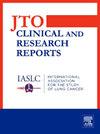PD-L1高表达(50-89%)与极高表达(≥90%)非小细胞肺癌患者接受pembrolizumab或cemiplimab一线治疗后的三年总生存期结果及相关分析
IF 3
Q2 ONCOLOGY
引用次数: 0
摘要
导言:转移性 NSCLC 患者的程序性细胞死亡配体 1(PD-L1)肿瘤比例评分(TPS)大于或等于 50%,不同患者对一线程序性细胞死亡蛋白 1 抑制剂的反应各不相同。我们曾在一项试验性研究中报道,PD-L1 TPS大于或等于90%的转移性NSCLC患者一线使用程序性细胞死亡蛋白1抑制剂的临床疗效比PD-L1 TPS大于或等于50%至89%的患者有所改善。在此,我们报告了两个大型独立队列中PD-L1 TPS大于或等于90%与50%至89%的患者使用pembrolizumab和cemiplimab一线治疗的三年生存率,并描述了这些PD-L1表达组之间的基因组和免疫表型差异,这些差异在很大程度上是未知的:我们分析了以下两个独立队列的三年疗效:(1) 来自美国四个学术中心、接受过 pembrolizumab 治疗的患者组成的多中心队列;(2) EMPOWER-Lung 1 随机 III 期试验,比较了一线 cemiplimab 和化疗。结果随访三年后,PD-L1 TPS大于或等于90%的患者的无进展生存期(危险比[HR],0.69;p <;0.001)和一线商用pembrolizumab的总生存期(HR,0.70;p <;0.01)明显改善,PD-L1 TPS大于或等于90%的患者的无进展生存期(危险比[HR],0.69;p <;0.001)和总生存期(HR,0.70;p <;0.01)明显改善,PD-L1 TPS大于或等于50%至89%的患者的总生存期(HR,0.70;p <;0.01)明显改善。在EMPOWER-Lung 1研究中,与PD-L1为50%至89%的患者相比,PD-L1 TPS大于或等于90%的患者在无进展生存期(HR,0.53;p <;0.0001)和总生存期(HR,0.63;p = 0.007)方面也有显著改善。553份NSCLC样本的肿瘤基因组图谱显示,与PD-L1 TPS大于或等于90%的肿瘤相比,STK11和SMARCA4的突变在PD-L1 TPS为50%至89%的肿瘤中明显更频繁(Q <0.15),而BRCA2在PD-L1 TPS大于或等于90%的NSCLC样本中富集(Q <0.15)。对93份NSCLC样本进行多重免疫荧光检测发现,PD-L1 TPS大于或等于90%的肿瘤中CD8+PD1+ T细胞比TPS为50%至89%的肿瘤中CD8+PD1+ T细胞多(p = 0.02)。结论与TPS为50%至89%的晚期NSCLC患者相比,Pembrolizumab和cemiplimab对PD-L1 TPS大于或等于90%的晚期NSCLC患者具有长期生存益处和良好的基因组和免疫表型特征。本文章由计算机程序翻译,如有差异,请以英文原文为准。
Three-Year Overall Survival Outcomes and Correlative Analyses in Patients With NSCLC and High (50%–89%) Versus Very High (≥90%) Programmed Death-Ligand 1 Expression Treated With First-Line Pembrolizumab or Cemiplimab
Introduction
Responses to first-line programmed cell death protein 1 inhibition vary among patients with metastatic NSCLC and a programmed death-ligand 1 (PD-L1) tumor proportion score (TPS) greater than or equal to 50%. We previously reported improved clinical outcomes to first-line programmed cell death protein 1 inhibition in patients with metastatic NSCLC with a PD-L1 TPS of greater than or equal to 90% versus 50% to 89% in a pilot study. Here, we report the three-year survival with first-line pembrolizumab and cemiplimab in two large independent cohorts of patients with PD-L1 TPS greater than or equal to 90% versus 50% to 89% and characterize genomic and immunophenotypic differences between these PD-L1 expression groups, which were largely unknown.
Methods
We analyzed three-year outcomes of the following two independent cohorts: (1) a multicenter cohort of patients from four academic centers in the United States treated with pembrolizumab and (2) EMPOWER-Lung 1, randomized, phase III trial comparing first-line cemiplimab with chemotherapy. Tumor genomic profiling and multiplexed immunofluorescence were performed to evaluate genomic and immunophenotypic correlates of very high PD-L1 expression.
Results
At three years of follow-up, progression-free survival (hazard ratio [HR], 0.69; p < 0.001) and overall survival (HR, 0.70; p < 0.01) to first-line commercial pembrolizumab were significantly improved in patients with a PD-L1 TPS greater than or equal to 90% versus 50% to 89%. In the EMPOWER-Lung 1, patients assigned to the cemiplimab arm with a PD-L1 TPS greater than or equal to 90% also had significant improvements in progression-free survival (HR, 0.53; p < 0.0001) and overall survival (HR, 0.63; p = 0.007) compared with those with a PD-L1 of 50% to 89%. Tumor genomic profiling of 553 NSCLC samples revealed that mutations in STK11 and SMARCA4 were significantly more frequent in tumors with a PD-L1 TPS of 50% to 89% compared with those with a PD-L1 TPS greater than or equal to 90% (Q < 0.15), whereas BRCA2 was enriched in NSCLC samples with a PD-L1 TPS greater than or equal to 90% (Q < 0.15). Multiplexed immunofluorescence on 93 NSCLC samples identified higher intratumoral CD8+PD1+ T cells (p = 0.02) in tumors with PD-L1 TPS greater than or equal to 90% versus 50% to 89%.
Conclusion
Pembrolizumab and cemiplimab were found to have long-term survival benefit and favorable genomic and immunophenotypic profile in patients with advanced NSCLC with PD-L1 TPS greater than or equal to 90% compared with TPS 50% to 89%.
求助全文
通过发布文献求助,成功后即可免费获取论文全文。
去求助
来源期刊

JTO Clinical and Research Reports
Medicine-Oncology
CiteScore
4.20
自引率
0.00%
发文量
145
审稿时长
19 weeks
 求助内容:
求助内容: 应助结果提醒方式:
应助结果提醒方式:


